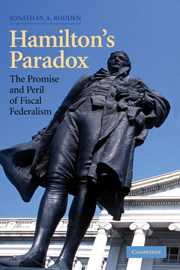Book contents
- Frontmatter
- Contents
- Preface
- Acknowledgments
- 1 INTRODUCTION AND OVERVIEW
- 2 PROMISE AND PERIL: INTELLECTUAL HISTORY
- 3 SOVEREIGNTY AND COMMITMENT
- 4 THE POWER OF THE PURSE: INTERGOVERNMENTAL GRANTS AND FISCAL DISCIPLINE
- 5 DISEASE OR CURE? POLITICAL PARTIES AND FISCAL DISCIPLINE
- 6 AN APPROACH TO COMPARATIVE CASE STUDIES
- 7 FISCAL FEDERALISM AND BAILOUTS IN POSTWAR GERMANY
- 8 THE CRISIS OF FISCAL FEDERALISM IN BRAZIL
- 9 THE CHALLENGE OF REFORM IN FEDERATIONS
- 10 THE ORIGINS OF SUBNATIONAL SOVEREIGNTY
- 11 CONCLUSIONS
- References
- Index
- Titles in the series
9 - THE CHALLENGE OF REFORM IN FEDERATIONS
Published online by Cambridge University Press: 14 January 2010
- Frontmatter
- Contents
- Preface
- Acknowledgments
- 1 INTRODUCTION AND OVERVIEW
- 2 PROMISE AND PERIL: INTELLECTUAL HISTORY
- 3 SOVEREIGNTY AND COMMITMENT
- 4 THE POWER OF THE PURSE: INTERGOVERNMENTAL GRANTS AND FISCAL DISCIPLINE
- 5 DISEASE OR CURE? POLITICAL PARTIES AND FISCAL DISCIPLINE
- 6 AN APPROACH TO COMPARATIVE CASE STUDIES
- 7 FISCAL FEDERALISM AND BAILOUTS IN POSTWAR GERMANY
- 8 THE CRISIS OF FISCAL FEDERALISM IN BRAZIL
- 9 THE CHALLENGE OF REFORM IN FEDERATIONS
- 10 THE ORIGINS OF SUBNATIONAL SOVEREIGNTY
- 11 CONCLUSIONS
- References
- Index
- Titles in the series
Summary
When the concurrence of a large number is required by the Constitution to the doing of any national act, we are apt to rest satisfied that all is safe, because nothing improper will be likely to be done; but we forget how much good may be prevented, and how much ill may be produced, by the power of hindering the doing of what may be necessary, and of keeping affairs in the same unfavorable posture in which they may happen to stand at particular periods.
Alexander Hamilton, The Federalist 22A basic problem of federalism is now painfully clear. After a good deal of bargaining, state representatives sign a constitutional contract, as in postwar Germany or postauthoritarian Brazil, setting the rules of the game for future interactions. A critical component of the bargain is that these rules are difficult to change. At the original contracting stage, states (especially small ones) insist on strong institutional protections out of concern for future expropriation and opportunism on the part of the other states or the federal government. In addition to constitutional protections backed up by courts, these contracts usually directly include the states as veto players over key legislative issues and require supermajorities or even unanimity for the renegotiation of the basic contract.
But as we have seen, the original contracts were not negotiated by benevolent planners behind veils of ignorance. They are political bargains that often deviate dramatically from the optimal distribution of authority laid out in fiscal federalism textbooks.
- Type
- Chapter
- Information
- Hamilton's ParadoxThe Promise and Peril of Fiscal Federalism, pp. 226 - 249Publisher: Cambridge University PressPrint publication year: 2005

